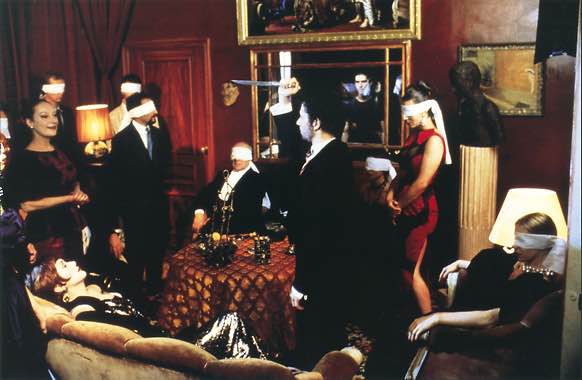Généalogie d'un crime (Ruiz, 1997) – First there's this strange anecdote about this Austrian child psychoanalyst who passed as authentic a young girl's diary she wrote herself in order to authenticate her own and Freud's theoretical propositions. That lady, Hermine Hugg-Hellmuth ended up murdered by her 18 years old nephew whom she had declared, after dream analysis at 5 years old, a tyrant of abnormal sexual motives and tendencies. Starting from this
fait divers, Ruiz proposes three other variations of this story, starting with a Chinese ghost story, where the murdered lady comes back to avenge her death, told at the beginning of the film as foreshadowing of what's to happen, existing within the film as the bedside book of the advocate's dead son, and repeated again at the end as a reading of the weirdness we go through in this narrative of echoes and duplication. The other two variations are the
stories of the film. The first one is a retelling of the Hugg-Hellmuth drama, in which a psychoanalyst observes murderous inclinations and declares her nephew a future murderer at the age of 5 – observations that he validates when murdering her once an adult. Most commentators of the film focus on the predetermination vs free will components of this narrative – and it is a valid and interesting avenue – but there's this other alternative, to me so much more Ruizian: the kid was neither predestined to become a murderer, nor did he act on free will, he was written in as a murderer, and the whole murder was a mise-en-scène. [Once arrested, the nephew blames the psychoanalytical society of which his aunt was a part for her murder - and the unfolding of the events tend to prove him right (they were responsible for the mise-en-scène – in a joyous ironic mirroring of Hugg-Hellmuth's fraudulous diary, they created the murder scene in order to authenticate their analysis of the young man as a future murderer). In real life, the nephew did come after Vienna's psychoanalytic society, saying his aunt ruined his life with her experiments and tests, but never accused them of being responsible for the murder.] The second variation of the story is of the young man's advocate. Punctuated with absurd humor and mocking of social conventions that has something of Bunuel, this story is in close relation to other Ruiz films of the time (mainly
Trois vies et une seule mort,
Shattered Image, and
Combat d'amour en songe) for its duplication of characters, but also to other main narrative motors of his works through the recourse to
tableaux vivants, games, and narrative switches (the film's main narration is of the advocate's deposition, but switches to the aunt's recount of her nephew's youth without changing actress - a narrative process mirrored in the film by the psychoanalytic games of "I'll be you and you'll be me" where characters are switching roles). The whole film is presented as a psychological thriller, but is never serious at that. Indebted in many ways to some of Ruiz's best films, and even though more accessible than most,
Généalogie d'un crime is first and foremost a subtle descendant of his (neo)baroque cinema. With rich visuals and camerawork, and this intricate narrative, it's a feast to the eye and the brain (the absurd comedic elements - often from the darker sides of humor - are only added bonus). A rival psychoanalyst, responsible for the
narrative syndrome or
shared novel theory, explains that the stories we tell are like illnesses and that they act on us, he believes that the aunt is the author of her own murder and that it was therefore suicide. He also believes that characters are reincarnated and proposes that he might be the reincarnation of one of the Karamazov brothers, an obvious nod to fellow hispanic director Manoel de Oliveira's
The Divine Comedy, but also another indication of being part of a story – the genealogy of which he is still working on. 9/10
(Very nice cast, with a brilliant Piccoli and in which even Melvil Poupaud feels right (he is a weak link in quite a few other Ruiz films), and, as always, great dialogues by Pascal Bonitzer. I enjoyed this film even more than I did 20 years ago)






